- Home
- H. Beam Piper
H. Beam Piper Page 2
H. Beam Piper Read online
Page 2
"Of course, there is also the question, so often raised by Mr. Pelton, that under the Hamilton machine, the politics, and particularly the enforcement of the laws, in this state, are unbelievably corrupt, but I wonder—"
Mongery paused. "Just a moment; I see a flash bulletin being brought in." The novice Literate came to his side and gave him a slip of paper, at which he glanced. Then he laughed heartily.
"It seems that shortly after I began speaking, the local blue-ribbon grand jury issued a summons for Chief Delaney to appear before them, with all his records. Unfortunately, the summons could not be served; Chief Delaney had just boarded a strato-rocket from Tom Dewey Field for Buenos Aires." He cocked an eye at the audience. "I know Irish is going to have a nice time, down there in the springtime of the Southern Hemisphere. And, incidentally, the Argentine is one of the few major powers which never signed the World Extradition Convention of 2087." He raised his hand to his audience. "And now, until tomorrow at breakfast, sincerely yours for Cardon's Black Bottle, Elliot C. Mongery."
"Well, whattaya know; that guy was plugging for you!" Ray said. "And see how he managed to slide in that bit about corruption, right before his stooge handed him that bulletin?"
"I guess every Literate has his price," Chester Pelton said. "I wonder how much of my money that cost. I always wondered why Frank Cardon sponsored Mongery. Now I know. Mongery can be had."
"Uh, beg your pardon, Mr. Pelton," a voice from the hall broke in.
He turned. Olaf Olafsson, the 'copter driver, was standing at the entrance to the breakfast nook, a smudge of oil on his cheek and his straw-colored hair in disorder. "How do I go about startin' this new 'copter?"
"What?" Olaf had been his driver for ten years. He would have been less surprised had the ceiling fallen in. "You don't know how to start it?"
"No, sir. The controls is all different from on the summer model. Every time I try to raise it, it backs up; if I try to raise it much more, we won't have no wall left on the landing stage."
"Well, isn't there a book?"
"There ain't no pictures in it; nothing but print. It's a Literate book," Olaf said in disgust, as though at something obscene. "An' there ain't nothin' on the instrument board but letters."
"That's right," Ray agreed. "I saw the book; no pictures in it at all."
"Well, of all the quarter-witted stupidity! The confounded imbeciles at that agency—"
Pelton started to his feet. Claire unlocked the table and slid it out of his way. Ray, on a run, started for the lift and vanished.
"I think some confounded Literate at the Rolls-Cadipac agency did that," he fumed. "Thought it would be a joke to send me a Literate instruction book along with a 'copter with a Literate instrument board. Ah, I get it! So I'd have to call in a Literate to show me how to start my own 'copter, and by noon they'd be laughing about it in every bar from Pittsburgh to Plattsburg. Sneaky Literate trick!" They went to the lift, and found the door closed in their faces. "Oh, confound that boy!"
Claire pressed the button. Ray must have left the lift, for the operating light went on, and in a moment the door opened. He crowded into the lift, along with his daughter and Olaf.
On the landing stage, Ray was already in the 'copter, poking at buttons on the board.
"Look, Olaf!" he called. "They just shifted them around a little from the summer model. This one, where the prop-control used to be on the old model, is the one that backs it up on the ground. Here's the one that erects and extends the prop,"—he pushed it, and the prop snapped obediently into place—"and here's the one that controls the lift."
An ugly suspicion stabbed at Chester Pelton, bringing with it a feeling of frightened horror.
"How do you know?" he demanded.
Ray's eyes remained on the instrument hoard. He pushed another button, and the propeller began swinging in a lazy circle; he pressed down with his right foot, and the 'copter lifted a foot or so.
"What?" he asked. "Oh, Jimmy showed me how theirs works. Mr. Hartnett got one like it a week ago." He motioned to Olaf, setting the 'copter down again. "Come here; I'll show you."
The suspicion, and the horror passed in a wave of relief.
"You think you and Olaf, between you, can get that thing to school?" he asked.
"Sure! Easy!"
"All right. You show Olaf how to run it. Olaf, as soon as you've dropped Ray at school, take that thing to the Rolls-Cadipac agency, and get a new one, with a proper instrument board, and a proper picture book of operating instructions. I'm going to call Sam Huschack up personally and give him royal hell about this. Sure you can handle it, now?"
He watched the 'copter rise to the two thousand foot local traffic level and turn in the direction of Mineola High School, fifty miles away. He was still looking anxiously after it as it dwindled to a tiny dot and vanished.
"They'll make it all right," Claire told him. "Olaf has a strong back, and Ray has a good head."
"It wasn't that that I was worried about." He turned and looked, half ashamed, at his daughter. "You know, for a minute, there, I thought ... I thought Ray could read!"
"Father!" She was so shocked that she forgot the nickname they had given him when he had announced his candidacy for Senate, in the spring. "You didn't!"
"I know; it's an awful thing to think, but—Well, the kids today do the craziest things. There's that Hartnett boy he runs around with; Tom Hartnett bought Literate training for him. And that fellow Prestonby; I don't trust him—"
"Prestonby?" Claire asked, puzzled.
"Oh, you know. The principal at school. You've met him."
Claire wrinkled her brow—just like her mother, when she was trying to remember something.
"Oh, yes. I met him at that P.T.A. meeting. He didn't impress me as being much like a teacher, but I suppose they think anything's good enough for us Illiterates."
Chapter 2
Literate First Class Ralph N. Prestonby remained standing by the lectern, looking out over the crowded auditorium, still pleasantly surprised to estimate the day's attendance at something like ninety-seven per cent of enrollment. That was really good; why, it was only three per cent short of perfect! Maybe it was the new rule requiring a sound-recorded excuse for absence. Or it could have been his propaganda campaign about the benefits of education. Or, very easily, it could have been the result of sending Doug Yetsko and some of his boys around to talk to recalcitrant parents. It was good to see that that was having some effect beside an increase in the number of attempts on his life, or the flood of complaints to the Board of Education. Well, Lancedale had gotten Education merged with his Office of Communications, and Lancedale was back of him to the limit, so the complaints had died out on the empty air. And Doug Yetsko was his bodyguard, so most of the would-be assassins had died, also.
The "North American Anthem," which had replaced the "Star-Spangled Banner" after the United States-Canadian-Mexican merger, came to an end. The students and their white-smocked teachers, below, relaxed from attention; most of them sat down, while monitors and teachers in the rear were getting the students into the aisles and marching them off to study halls and classrooms and workshops. The orchestra struck up a lively march tune. He leaned his left elbow—Literates learned early, or did not live to learn, not to immobilize the right hand—on the lectern and watched the interminable business of getting the students marched out, yearning, as he always did at this time, for the privacy of his office, where he could smoke his pipe. Finally, they were all gone, and the orchestra had gathered up its instruments and filed out into the wings of the stage, and he looked up to the left and said, softly:
"All right, Doug; show's over."
With a soft thud, the big man dropped down from the guard's cubicle overhead, grinning cheerfully. He needed a shave—Yetsko always did, in the mornings—and in his leather Literates' guard uniform, he looked like some ogreish giant out of the mythology of the past.
"I was glad to have you up there with the Big Noise, this mo
rning," Prestonby said. "What a mob! I'm still trying to figure out why we have such an attendance."
"Don't you get it, captain?" Yetsko was reaching up to lock the door of his cubicle; he seemed surprised at Prestonby's obtuseness. "Day before election; the little darlings' moms and pops don't want them out running around. We can look for another big crowd tomorrow, too."
Prestonby gave a snort of disgust. "Of course; how imbecilic can I really get? I didn't notice any of them falling down, so I suppose you didn't see anything out of line."
"Well, the hall monitors make them turn in their little playthings at the doors," Yetsko said, "but hall monitors can be gotten at, and some of the stuff they make in Manual Training, when nobody's watching them—"
Prestonby nodded. Just a week before, a crude but perfectly operative 17-mm shotgun had been discovered in the last stages of manufacture in the machine shop, and five out of six of the worn-out files would vanish, to be ground down into dirks. He often thought of the stories of his grandfather, who had been a major during the Occupation of Russia, after the Fourth World War. Those old-timers didn't know how easy they'd had it; they should have tried to run an Illiterate high school.
Yetsko was still grumbling slanders on the legitimacy of the student body. "One of those little angels shoots me, it's just a cute little prank, and we oughtn't to frown on the little darling when it's just trying to express its dear little personality, or we might give it complexes, or something," he falsettoed incongruously. "And if the little darling's mistake doesn't kill me outright and I shoot back, people talk about King Herod!" He used language about the Board of Education and the tax-paying public that was probably subversive within the meaning of the Loyalty Oath. "I wish I had a pair of 40-mm auto-cannons up there, instead of that sono gun."
"Each class is a little worse than the one before; in about five years, they'll be making H-bombs in the lab," Prestonby said. In the last week, a dozen pupils had been seriously cut or blackjacked in hall and locker-room fights. "Nice citizens of the future; nice future to look forward to growing old in."
"We won't," Yetsko comforted him. "We can't be lucky all the time; in about a year, they'll find both of us stuffed into a broom closet, when they start looking around to see what's making all the stink."
Prestonby took the thick-barreled gas pistol from the shelf under the lectern and shoved it into his hip pocket; Yetsko picked up a two-and-a-half foot length of rubber hose and tucked it under his left arm. Together, they went back through the wings and out into the hallway that led to the office. So a Twenty-second Century high school was a place where a teacher carried a pistol and a tear-gas projector and a sleep-gas gun, and had a bodyguard, and still walked in danger of his life from armed 'teen-age hooligans. It was meaningless to ask whose fault it was. There had been the World Wars, and the cold-war interbellum periods—rising birth rates, huge demands on the public treasury for armaments, with the public taxed to the saturation point, and no money left for the schools. There had been fantastic "Progressive" education experiments—even in the 'Fifties of the Twentieth Century, in the big cities, children were being pushed through grade school without having learned to read. And when there had been money available for education, school boards had insisted on spending it for audio-visual equipment, recordings, films, anything but textbooks. And there had been that lunatic theory that children should be taught to read by recognizing whole words instead of learning the alphabet. And more and more illiterates had been shoved out of the schools, into a world where radio and television and moving pictures were supplanting books and newspapers, and more and more children of illiterates had gone to school without any desire or incentive to learn to read. And finally, the illiterates had become Illiterates, and literacy had become Literacy.
And now, the Associated Fraternities of Literates had come to monopolize the ability to read and write, and a few men like William R. Lancedale, with a handful of followers like Ralph N. Prestonby, were trying—
The gleaming cleanliness of the corridor, as always, heartened Prestonby a little; it was a trophy of victory from his first two days at Mineola High School, three years ago. He remembered what they had looked like when he had first seen them.
"This school is a pig pen!" he had barked at the janitorial force. "And even if they are Illiterates, these children aren't pigs; they deserve decent surroundings. This school will be cleaned, immediately, from top to bottom, and it'll be kept that way."
The janitors, all political appointees, Independent-Conservative party-hacks, secure in their jobs, had laughed derisively. The building superintendent, without troubling to rise, had answered him:
"Young man, you don't want to get off on the wrong foot, here," he had said. "This here's the way this school's always been run, an' it's gonna take a lot more than you to change it."
The fellow's name, he recalled, was Kettner; Lancedale had given him a briefing which had included some particulars about him. He was an Independent-Conservative ward-committeeman. He had gotten his present job after being fired from his former position as mailman for listening to other peoples' mail with his pocket recorder-reproducer.
"Yetsko," he had said. "Kick this bum out on his face."
"You can't get away with—" Kettner had begun. Yetsko had yanked him out of his chair with one hand and started for the door with him.
"Just a moment, Yetsko," he had said.
Thinking that he was backing down, they had all begun grinning at him.
"Don't bother opening the door," he had said. "Just kick him out."
After the third kick, Kettner had gotten the door open, himself; the fourth kick sent him across the hall to the opposite wall. He pulled himself to his feet and limped away, never to return. The next morning, the school was spotless. It had stayed that way.
Beside him, Yetsko must also have returned mentally to the past.
"Looks better now than it did when we first saw it, captain," he said.
"Yes. It didn't take us as long to clean up this mess as it did to clean up that mutinous guards company in Pittsburgh. But when we cleaned that up, it stayed cleaned. This is like trying to bail out a boat with a pitchfork."
"Yeah. I wish we'dda stayed in Pittsburgh, captain. I wish we'd never seen this place!"
"So do I!" Prestonby agreed, heartily.
No, he didn't, either. If he'd never have come to Mineola High School, he'd never have found Claire Pelton.
Sitting down again at the breakfast table with her father, Claire levered another cigarette out of the Readilit and puffed at it with exaggeratedly bored slowness. She was still frightened. Ray shouldn't have done what he did, even if he had furnished a plausible explanation. The trouble with plausible explanations was having to make them. Sooner or later, you made too many, and then you made one that wasn't so plausible, and then all the others were remembered, and they all looked phony. And why had the Senator had to mention Ralph? Was he beginning to suspect the truth about that, too?
I hope not! she thought desperately. If he ever found out about that, it'd kill him. Just kill him, period!
Mrs. Harris must have turned off the video, after they had gone up to the landing stage. To cover her nervousness, she reached up and snapped it on again. The screen lit, and from it a young man with dark eyes under bushy black brows was shouting angrily:
"... Most obvious sort of conspiracy! If the Radical-Socialist Party leaders, or the Consolidated Illiterates' Organization Political Action Committee, need any further evidence of the character of their candidate and idolized leader, Chester Pelton, the treatment given to Pelton's candidacy by Literate First Class Elliot C. Mongery, this morning, ought to be sufficient to remove the scales from the eyes of the blindest of them. I won't state, in so many words, that Chester Pelton's sold out the Radical-Socialists and the Consolidated Illiterates' Organization to the Associated Fraternities of Literates, because, since no witness to any actual transfer of money can be found, such a statement would be libelou
s—provided Pelton had nerve enough to sue me."
"Why, you dirty misbegotten illegitimate—!" Pelton was on his feet. His hand went to his hip, and then, realizing that he was unarmed and, in any case, confronted only by an electronic image, he sat down again.
"Pelton's been yapping for socialized Literacy," the man on the screen continued. "I'm not going back to the old argument that any kind of socialization is only the thin edge of the wedge which will pry open the pit of horrors from which the world has climbed since the Fourth World War. If you don't realize that now, it's no use for me to repeat it again. But I will ask you, do you realize, for a moment, what a program of socialized Literacy would mean, apart from the implications of any kind of socialization? It would mean that inside of five years, the Literates would control the whole government. They control the courts, now—only a Literate can become a lawyer, and only a lawyer can become a judge. They control the armed forces—only a Literate can enter West Point or Fort MacKenzie or Chapultepec or White Sands or Annapolis. And, if Chester Pelton's socialization scheme goes into effect, there will be no branch of the government which will not be completely under the control of the Associated Fraternities of Literates!"
The screen went suddenly dark. Her father turned, to catch her with her hand still on the switch.
"Put it back on; I want to hear what that lying pimp of a Slade Gardner's saying about me!"
"Phooy; you'd have shot it out, yourself, if you'd had your gun on. I saw you reaching for it. Now be quiet, and take it easy," she ordered.
He reached toward the Readilit for a cigarette, then his hand stopped. His face was contorted with pain; he gave a gasp of suffocation.
Claire cried in dismay: "You're not going to have another of those attacks? Where are the nitrocaine bulbs?"
"Don't ... have any ... here. Some at the office, but—"
"I told you to get more," she accused.
"Oh, I don't need them, really." His voice was steadier, now; the spasm of pain had passed. He filled his coffee cup and sipped from it. "Turn on the video again, Claire. I want to hear what that Gardner's saying."

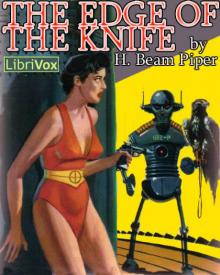 The Edge of the Knife
The Edge of the Knife Genesis
Genesis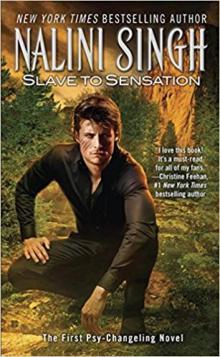 A Slave is a Slave
A Slave is a Slave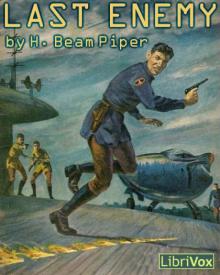 Last Enemy
Last Enemy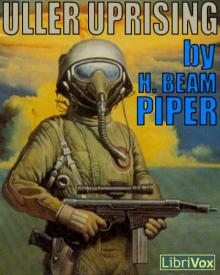 Uller Uprising
Uller Uprising Ministry of Disturbance
Ministry of Disturbance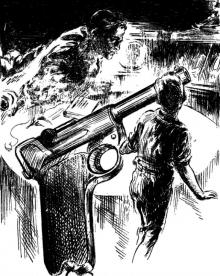 Time and Time Again
Time and Time Again The Mercenaries
The Mercenaries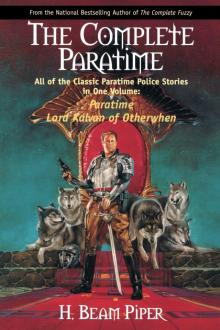 Police Operation
Police Operation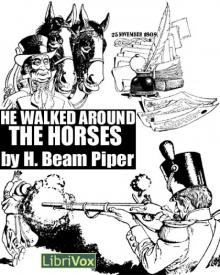 He Walked Around the Horses
He Walked Around the Horses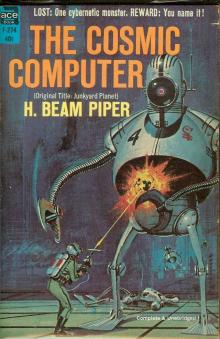 Time Crime
Time Crime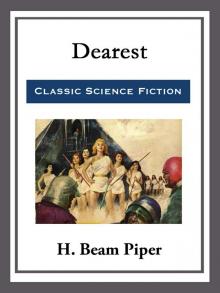 Dearest
Dearest Day of the Moron
Day of the Moron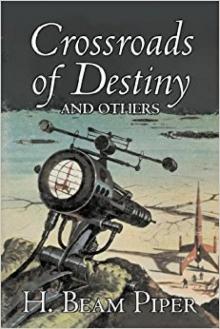 Crossroads of Destiny
Crossroads of Destiny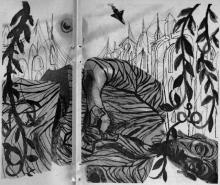 Graveyard of Dreams
Graveyard of Dreams The Cosmic Computer
The Cosmic Computer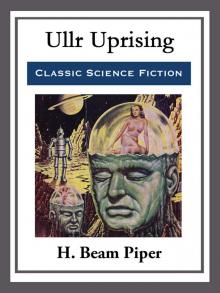 Ullr Uprising
Ullr Uprising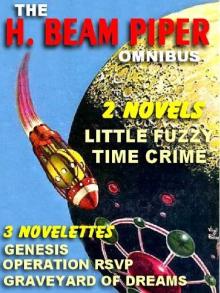 Operation R.S.V.P.
Operation R.S.V.P.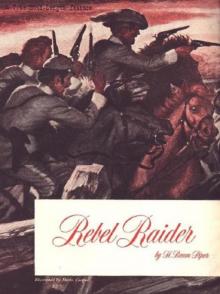 Rebel Raider
Rebel Raider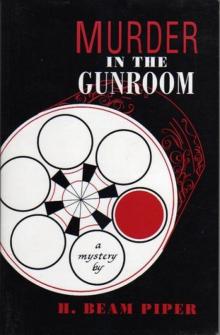 Murder in the Gunroom
Murder in the Gunroom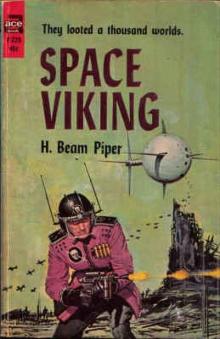 Space Viking
Space Viking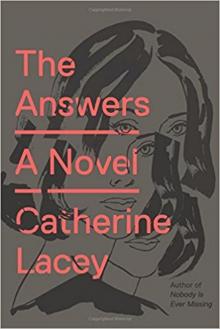 The Answer
The Answer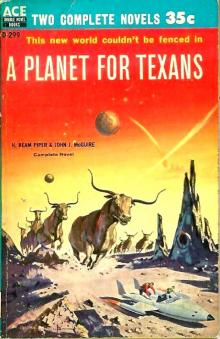 A Planet for Texans (aka Lone Star Planet)
A Planet for Texans (aka Lone Star Planet)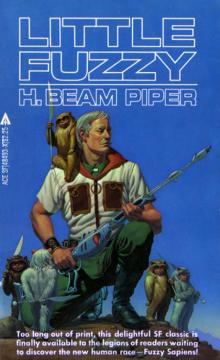 Little Fuzzy
Little Fuzzy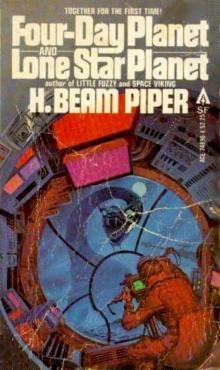 Four-Day Planet
Four-Day Planet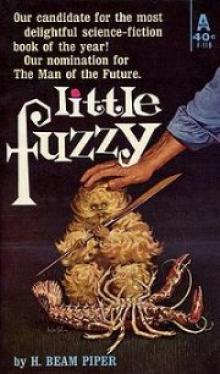 Little Fuzzy f-1
Little Fuzzy f-1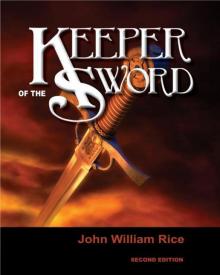 Keeper
Keeper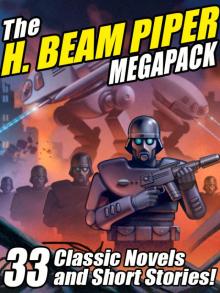 The H. Beam Piper Megapack
The H. Beam Piper Megapack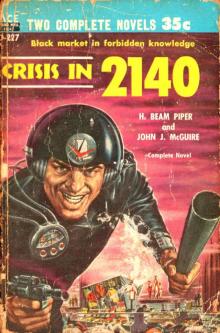 H. Beam Piper
H. Beam Piper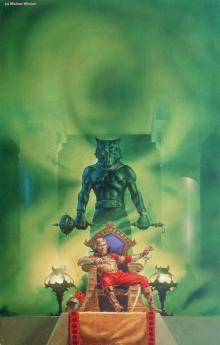 Lord Kalvan of Otherwhen
Lord Kalvan of Otherwhen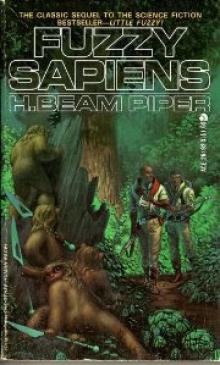 Fuzzy Sapiens f-2
Fuzzy Sapiens f-2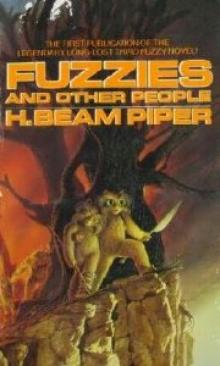 Fuzzies and Other People f-3
Fuzzies and Other People f-3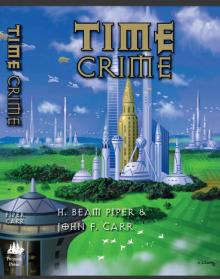 TIME PRIME
TIME PRIME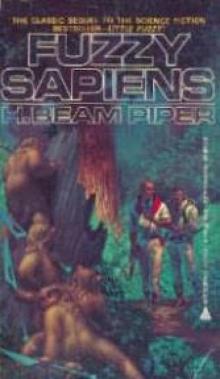 Fuzzy Sapiens
Fuzzy Sapiens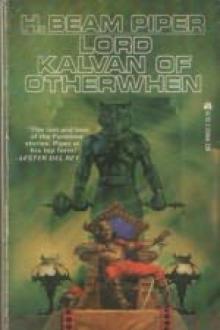 Lord Kalvan of Otherwhen k-1
Lord Kalvan of Otherwhen k-1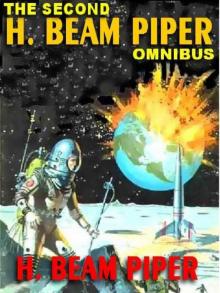 The Second H. Beam Piper Omnibus
The Second H. Beam Piper Omnibus